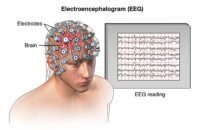A promising new study on electroencephalograms (EEG), a non-invasive way of measuring electrical activity in your brain.
“[A new study suggests that] measuring electrical activity in the brain can help predict a patient’s response to an antidepressant.
…. The project’s first published study focuses on how electrical activity in the brain can indicate whether a patient is likely to benefit from an SSRI (selective serotonin re-uptake inhibitor), the most common class of antidepressant. Researchers used an electroencephalogram, or EEG, a noninvasive test that measured activity in the brain’s rostral anterior cingulate cortex. Patients with higher activity were more likely to respond to the SSRI within about two months.
Dr. Trivedi said EEGs have the potential to be used in combination with brain imaging and blood tests to help patients who don’t respond to SSRIs find effective treatments more quickly. He also suggested that more studies may yield useful methods to boost neural activity and make the brain more responsive to SSRIs – perhaps either through psychotherapy or magnetic stimulation on the cortex.”
This would be awesome.
One of the hardest things about trying antidepressants is that people often respond to medications differently.
What works for you might be bad for me, and vice versa.
I tried about five, and had nearly given up, before finding one that worked extraordinarily well.
Many times, skeptics use this hit-and-miss nature to hammer the entire notion of medication, but the fact is that research is proving just how unique our specific genes are to depression, and thus, you really can’t one-size-fits-all an antidepressant.
As always, talk to your doctor.

